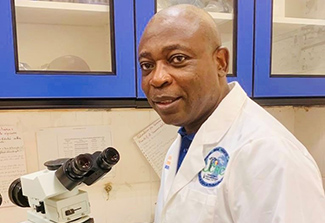Because of a lapse in government funding, the information on this website may not be up to date, transactions submitted via the website may not be processed, and the agency may not be able to respond to inquiries until appropriations are enacted. The NIH Clinical Center (the research hospital of NIH) is open. For more details about its operating status, please visit
cc.nih.gov. Updates regarding government operating status and resumption of normal operations can be found at
opm.gov.
South-South partnership bolsters the fight against viral disease in West Africa
July / August 2022 | Volume 21 Number 4
 Photo courtesy of Ibrahima Dia/UCRC Dr. Seydou Doumbia working in the UCRC laboratory, an initiative of the Malian government, the University of Science, Techniques, and Technologies of Bamako, and NIAID.
Photo courtesy of Ibrahima Dia/UCRC Dr. Seydou Doumbia working in the UCRC laboratory, an initiative of the Malian government, the University of Science, Techniques, and Technologies of Bamako, and NIAID.
The first case of the 2014-2016 Ebola outbreak was traced back to a child in Guinea who was infected with the virus three months before an outbreak was declared. Guinea was one of the countries hardest hit by the virus. Another West African nation, Mali, was able to contain the virus much faster than their neighbors to the north.
Between the two nations, there were over 3,800 confirmed cases of Ebola and almost 2,600 deaths. Of these, only eight cases (and six deaths) occurred in Mali, according to the CDC. During the Guinea outbreak, Mali supported Guineans wherever possible, forging a collaborative partnership between the two nations.
The
Mali-Guinea Emerging Infectious Disease Research Training Program (Mali-Guinea EID-RTP) is a new program funded by Fogarty and the National Institute of Allergy and Infectious Diseases (NIAID) that will strengthen this ongoing South-South collaboration between the University of Science, Techniques, and Technologies of Bamako (USTT-B) in Mali and the University of Conakry in Guinea. The program will also draw on the expertise of researchers from NIAID, Johns Hopkins University, and Northwestern University. The program will be run by principal investigators (PIs) who worked on the front lines of the Ebola outbreak.
"A unique factor of this program is that we will be performing genomic characterization of emerging infectious pathogens, something we have not been able to do with previous grants," said Dr. Seydou Doumbia, a PI in the training program. Doumbia is the Dean of the Faculty of Medicine and Odontostomatology at USTT-B. He is also the Director of the University Clinical Research Center (UCRC) at Bamako.
Because of the geographic and cultural proximity of the two nations, it was a natural fit. Culturally Mali and Guinea have many similarities as both are francophone nations in a region where English is the predominant language in academia. The program anticipates that the research landscape for the next disease outbreak will look very different in Guinea by building up the research infrastructure there. Mali is a prime example of how that could look.
"After years of intentional investment in the region, Mali has become a scientific powerhouse in terms of malaria research," said Elizabeth Higgs, a Global Health Science Advisor with NIAID, who was part of the team who initially launched the
Partnership for Research on Vaccines and Infectious Diseases in Liberia (PREVAIL) study. "Fogarty programs like these [planning grants] are essential to building capacity and developing this cadre of scientists, prepared to fight future outbreaks."
Mali faired far more favorably during the Ebola epidemic in comparison to its neighbors due to almost 30 years of investment into malaria research and the establishment of the Malaria Research and Training Center (MRTC) at the National School of Medicine and Pharmacy, which has facilitated research with NIAID and other international partners. "Having the NIH lab there allowed us to avoid delays in diagnosis, prevent the spread of disease, and prepare for future cases," said Doumbia. The UCRC laboratory was initially established to study HIV/AIDS and tuberculosis. However, because of the existing infrastructure, they could quickly switch gears to test and isolate Ebola cases and conduct contact tracing, further discouraging the spread of the disease in the country.
The Mali-Guinea Emerging Infectious Disease Research Training Program was met with enthusiasm from ministers of health across the region and aims to train six doctoral students and 15 master's students over the next five years. Doumbia says, "This program will be a tremendous resource. Not only for Mali and Guinea but for West Africa and other francophone countries throughout the continent."
More Information
Updated August 11, 2022
To view Adobe PDF files,
download current, free accessible plug-ins from Adobe's website.
Related Fogarty Programs
Related World Regions / Countries
Related Global Health Research Topics